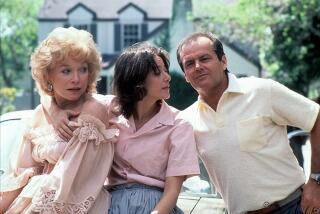THE OPEN SECRET THAT MAKES ‘MY SUCCESS’ A HIT
- Share via
The movies, always chock-full of contradictions, thrive equally on the pleasure of surprise and the comfort of the familiar.
A certain kind of film says, “Don’t count on anything.” A supreme example is Hitchcock’s “Psycho,” in which the principal star is bumped off hardly a third of the way through and the surviving good guy gets it only a little while later.
(I once remarked to Hitchcock that it seemed daring to kill off a star so early. “It should happen more often,” he growled.)
It doesn’t always work. John Wayne was bumped off in a cowardly fashion part way into “The Cowboys.” But the Duke’s fans did not enjoy seeing him lose, and whatever the excellences of the film, it did not prosper.
Another kind of film says, “You’ve been here before and you had a good time, so settle back and enjoy again.” These films may well not please the critics, who live always in the hope of the different. But if these films of the familiar have the charm of their principals and the courage of their unimportance, they may well make it with audiences.
We need look no further to explain the resounding early box-office business being done by “The Secret of My Success,” the secret of whose success is that it is sleekly mounted, handsomely photographed, winsomely cast and surpassingly foolish and familiar.
Michael J. Fox, hoarse-voiced and appealing, is by Horatio Alger out of “Winning Through Intimidation,” with a spiritual leavening of the Artful Dodger and “How to Succeed in Business Without Really Trying” in his genealogy as well.
There is a who’s-in-whose-bedroom? scene that is right from the “Flea in Her Ear” tradition of Georges Feydeau’s Parisian farces, updated to exurban Connecticut and made more explicit verbally, although at no great gain in joy.
The thing about being inspired is going to the best sources for your inspiration, and I think it fair to say that A. J. Carothers, who wrote the initial story and screenplay, and the “Top Gun” team of Jack Epps Jr. and Jim Cash, who did the final version, knew what to celebrate.
The other blithe spirits hovering about would include “The Apartment” (boss co-opting a junior employee in his adulterous plottings) and, more faintly, “The Graduate” (the seduction of the not entirely innocent young man by a more senior lady).
It is overall a kind of hydrofoil operation, in which everything rides on a cushion of air a safe distance above reality. The trick in these matters is to preserve a brisk if not breakneck forward motion, lest the fragile vehicle brush against reality and crash.
Herbert Ross and his editor, Paul Hirsch, have seen that the rush doesn’t let up from start to finish. But, against the chance that random thoughts should fly up, like spindrift from the waves, there is a strident and continuous sound track.
If it is not always a pleasure to hear, “The Secret of My Success” is always a pleasure to see. Carlo Di Palma, who did Antonioni’s “Red Desert” and has become Woody Allen’s principal cinematographer, catches Manhattan, again, in all its teeming majesty, and finds excitement in reflections.
There was a moment in a silly revival called “Sweethearts” on Broadway years ago when the comedian Bobby Clark, he of the painted-on glasses, cried, “Never was a thin plot so complicated!” Here, never was a thin plot so grand to look upon.
Margaret Whitton, as Richard Jordan’s voracious wife, is a supportive comedienne in a lively and excellent Hollywood tradition, and Helen Slater is an attractive heroine. They nicely bracket the engaging Mr. Fox.
“The Secret of My Success” is the safely familiar, pre-shrunk and vat-dyed, but there are worse things.
In writing about “Making Mr. Right” a week ago, I did not say, as I should have, that the script was co-authored by Laurie Frank, with Floyd Byars.
More to Read
Only good movies
Get the Indie Focus newsletter, Mark Olsen's weekly guide to the world of cinema.
You may occasionally receive promotional content from the Los Angeles Times.










